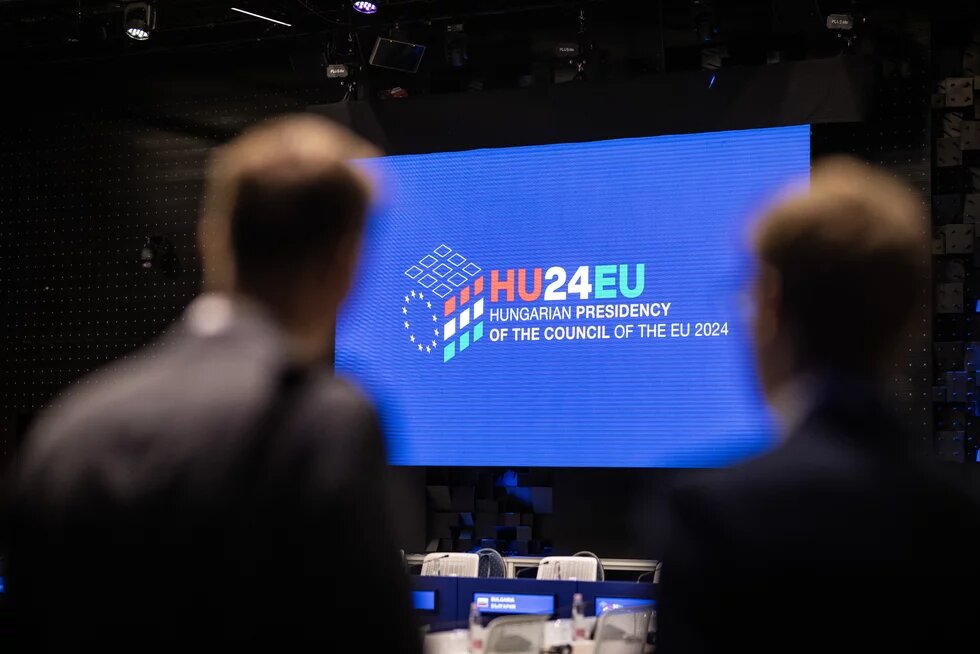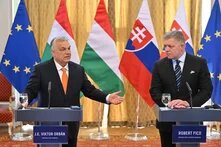Orbán aims to make a big impact during Hungary's six-month EU presidency, starting with a controversial visit to Moscow. Shortly after, his party, Fidesz, joined the far-right Patriots alliance in the European Parliament—a long-time goal for Orbán, despite its likely marginal influence. Betting on Trump's re-election, Orbán still ensured a handshake with Biden at the NATO summit. Meanwhile, EU leaders are increasingly sidelining him during his presidency.

Kick-off with a Diplomatic Shock Move
Viktor Orbán’s recent diplomatic manoeuvres, particularly his controversial visit to Moscow, have sparked significant dismay and anger among EU leaders. This visit marked the first official meeting between a European Union leader and Russian President Vladimir Putin since the early months of Russia’s invasion of Ukraine in 2022. The EU’s leaders immediately distanced themselves from Orbán’s surprise move to go to Moscow. And even as Orbán constantly tries to underline his “pro-peace stance”, just days ahead of the Moscow trip, the Hungarian prime minister met Volodimir Zelensky in Kyiv, where he did not mention at all that he was heading to Moscow to meet Putin in just a few days.
The backlash was swift and severe. Lithuanian President Gitanas Nausėda, Latvian Prime Minister Evika Siliņa, and Swedish Prime Minister Ulf Kristersson, among others, condemned Orbán’s actions, asserting that he does not represent the EU and criticising his use of the EU presidency to further his own agenda. The meeting with Putin was seen as undermining EU efforts to support Ukraine and maintain a united front against Russian aggression. Political analysts agree this is a clear sign of the lack of real Hungarian efforts to bring Europe closer to peace.
Likewise, in a leaked letter (seen by Hungarian daily Népszava) written by the European Council president to the Hungarian PM, Charles Michel refuted Viktor Orbán’s claims that the EU pursues “war policies”. He emphasised the EU’s commitment to a comprehensive and just peace in Ukraine. Michel stressed that the EU’s stance is determined by consensus among its leaders and highlighted the unwavering support for Ukraine’s defence against Russian aggression. He wrote that Hungary’s EU presidency has no mandate to represent the EU internationally, underscoring that peace requires Russia to withdraw its forces and to respect Ukraine’s territorial integrity. Michel’s words were echoed in a related statement from Josep Borrell, the EU’s top diplomat, in which he made it clear that Orbán’s actions are not representative of the EU’s stance.
The timing and nature of this visit have been perceived as a direct affront to EU policies and solidarity, further complicating Hungary’s six-month rotating EU Council presidency, which began on 1 July 2024.
Verbal Sparring without Legal Implications
Since its early preparatory phase, the Hungarian EU presidency has been widely criticised by numerous sides across the EU’s political spectrum. The ongoing rule of law procedures and a large pile of infringements and legal disputes between Brussels and Budapest are widely seen as evidence that Hungary should not be permitted to represent the EU and its interests. Despite all the dialogue back and forth, no EU-level legal action took place in order to halt Hungary’s EU presidency.
Then as a pretext, a few days ahead of the kick-start, the European Commission (EC) informed the press that President Ursula von der Leyen’s traditional visit to Budapest, scheduled for early July 2024, and in which she would be joined by a pool of EC commissioners, is postponed until September. According to the official line, the reason was conflicting agendas. Since then, EUrologus has heard from multiple EC sources that the trip might not be happening at all. Similarly, the informal, Budapest-organised energy ministers council meeting will be marked by low-level state secretaries, and the EC is not even willing to have representation at the director level at the meeting.
In a similar manner, Orbán’s latest actions have led to discussions among EU diplomats in Brussels and in the capitals about possibly boycotting a forthcoming foreign affairs meeting in Budapest, effectively sidelining Hungary’s presidency. The move is seen as a reprimand for Orbán’s unilateral diplomacy and an effort to prevent Hungary from using its presidency to amplify its controversial foreign policy stances and fake sovereignty stance. EU ministers, tasked with attending such council meetings, are less than enthusiastic to be paraded around as props for Orbán’s peace propaganda, and would likely take any excuse to miss the event, such as a conflicting assembly in Brussels, conveniently being held at the same time.
Orban Walking on a Narrow European Path
Another noteworthy circumstance of the presidency is Orbán’s failed bet on saying no to the re-election of Ursula von der Leyen, who got 40 votes more than necessary at her European Parliamentary plenary re-election vote on 18 July. In a well-earned political response, von der Leyen used her talking minutes ahead of the vote on her second term to speak out against Orbán and his populist, pro-Russian stance without naming the Hungarian PM.
It should not be forgotten that the European post-election positioning is still ongoing. After the re-election of Ursula von der Leyen, negotiations over commission portfolios may bring some surprises. The far-right’s self-marginalisation doesn’t mark the end of rightward shifts; due to the rising popularity of radical parties, some members of the European People’s Party (EPP) aim to shift right on immigration, green policies, and cultural issues in order to retain their base. Some EPP members, including von der Leyen, may collaborate with the European Conservatives and Reformists (ECR) However, national government changes in the Netherlands, Belgium, France, Austria, and Germany will impact EU politics significantly more than the composition of far-right factions.
The Biggest Small Actor Behind the Cordon Sanitaire
Orbán may have initially hoped that forming the new, far-right party group Patriots would give him the political legitimacy and importance he desires. Hungary’s Fidesz has endured relative obscurity in the European Parliament since the party was suspended and consequentially left the EPP in 2021. As in the European Parliament, most positions from vice presidents to committee chairs are largely distributed across the party groups; being independent does make it more difficult for a party to acquire positions and negotiating power.
Looking at Patriots, at first glance, it would seem like far-right actors, like Fidesz, are back in the game, but this would be misleading. Patriots, with 84 MEPs, rose to become the third largest party group in the EP. Among its 13 member parties, there are some significant political parties, like France’s National Front, Italy’s League, Spain’s Vox, Austria’s popular, far-right party FPÖ, and ANO, Andrej Babiš’s Czech party, which jumped right over from the liberal Renew to the Patriot group. They and a few additional, slightly smaller far-right actors make up a decent-sized fraction in the EP, largely replacing the Identity and Democracy Group, the populist-radical group prominent in the last parliamentary cycle.
Yet, Patriots faced the same problem as other far-right groups before them: cordon sanitaire. The majority of the parliament, meaning a group consisting of EPP, European Socialists and Democrats, Renew, Greens/EFA and the Left, similarly to the last cycle, ensured that no far-right politician would be approved for major jobs, including vice presidencies. Patriots blissfully ignored this precedent, and Jordan Bardella, the president of the EP group, still said a few weeks before the vote that they expect to receive two vice president spots based on their size. In total, the EP elected 14 vice presidents, out of 17 candidates. The three unsuccessful candidates were, unsurprisingly, the two nominated by Patriots and another far-right candidate from the relatively smaller far-right group, Europe of Sovereign Nations.
Neither Hungary’s EU presidency nor developments in the EP promise Fidesz a real way to determine the EU’s agenda. The Hungarian party and its allies have successfully alienated all other EU actors, who have decided to basically ignore their existence, at least when it comes to forming major policy. Therefore, the Hungarian presidency promises simply to be a drag for the EU’s administration rather than a real challenge to the status quo.


